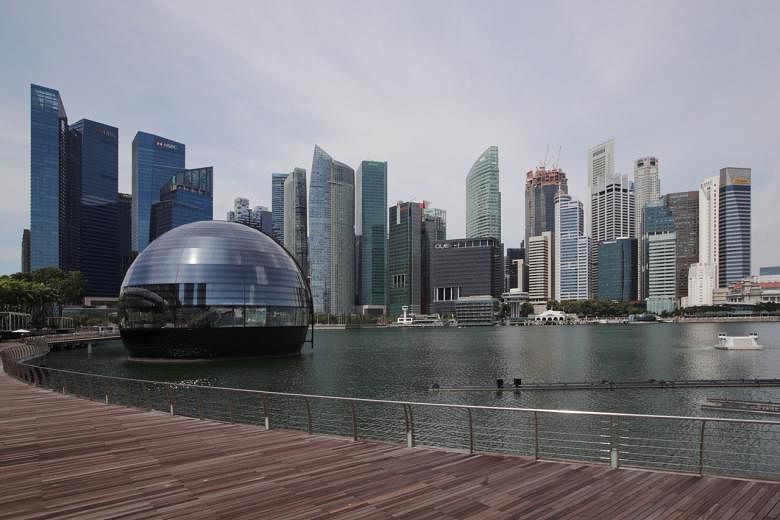SINGAPORE - Covid-19 has created an unprecedented impetus for digital adoption among businesses and individuals in Singapore, and the country can create new opportunities in the virtual realm post-pandemic if it plays to its strengths.
In a report released on Monday (May 17), the Emerging Stronger Taskforce suggested providing digital services in areas that tap Singapore's strengths of trust, speed, consistency and systems-level coordination.
"We have always found ways for our economy to transcend our physical boundaries - as a major air hub, an international maritime centre, a hub for financial and professional services, and a trusted gateway to Asia. We must now do the same in the virtual realm," said the task force, which was set up last May to guide Singapore's economic recovery from the pandemic.
In its report, the task force said it envisions Singapore taking its Smart Nation aspirations global to unlock "virtually unlimited opportunities" for businesses and talent, as well as cities.
Elaborating on these plans, it said businesses must move quickly to sell their products and services overseas such that they can grow and create new markets.
Such digital services may include the provision of business-to-business professional services such as security and diagnostics to digital companies.
For instance, the Grow Digital initiative launched by the Infocomm Media Development Authority and Enterprise Singapore in June 2020 provides support for small and medium-sized enterprises (SMEs) in selling goods abroad through e-commerce platforms.
There are also opportunities for physical retailers and e-commerce platforms to work together through partnerships, said CapitaLand group chief executive officer Lee Chee Koon, who co-leads the Alliance for Action (AfA) on Facilitating Smart Commerce.
He cited a collaboration between CapitaLand and Sea Ltd's e-commerce platform Shopee, when CapitaLand's IMM outlet mall debuted as Shopee's first virtual shopping centre from Singapore in February. This enabled IMM retailers to reach out to a wider audience, and they reported good sales results, said Mr Lee.
"That was a very encouraging sign (that) shows how online and offline players could work together," he added.
With the prospect of a global remote workforce, training institutions in Singapore such as institutes of higher learning and corporate academies, as well as technology players and start-ups, can also expand their markets by providing virtual training service globally.
For instance, corporate academies offering industry-relevant training can scale up their operations to provide training to local SMEs and overseas learners where suitable.
"This would enable Singapore corporates to identify and attract regional and global talent, and equip Singapore SMEs to internationalise," said the task force.
Additionally, Singapore can also redefine itself as a safe and smart city for trade, business, work and leisure by tapping technology to lay the foundation for the safe resumption of travel.
In doing so, it can win the confidence of governments, industries and consumers, which can further boost its relevance to the world.
For instance, the Alliance for Action on Enabling Safe and Innovative Visitor Experiences has been working on solutions to facilitate the progressive resumption of activities in the tourism sector, which has been hard hit by travel restrictions.
These include developing a Web application as a one-stop resource that can help travellers and the industry manage pre-arrival procedures and post-arrival itineraries.
Singapore Hotel Association president Kwee Wei-Lin, who co-chairs the alliance, said the AfA, which is made up of public agencies, private companies and unions, helps the industry to stay quick and nimble in its approach to transformation.
The task force said Singapore has to resist the forces of anti-globalisation and protectionism by remaining open - particularly to global talent and skills - in order to achieve this vision of charting new virtual frontiers for the economy.
"(This is) so that businesses can access best-in-class ideas and understand consumers and businesses beyond our shores, and Singaporeans can continue to learn from the best in the world."
One other key challenge will be ensuring that smaller companies and Singaporeans who operate in the more domestic-facing sectors of the economy can also access opportunities in serving and working with the world's best, said the task force.
"At the same time, we will also need to think about the new norms and strategic capabilities we need to build to secure our place and thrive in our new virtual frontiers," it added.


